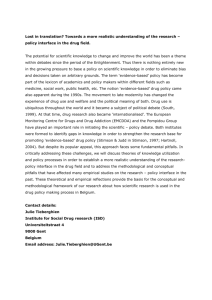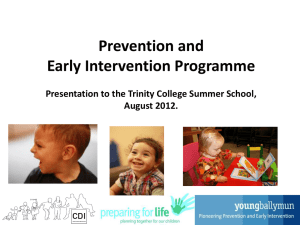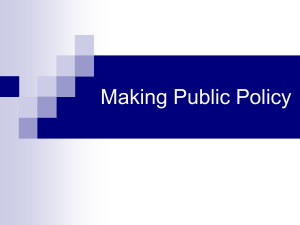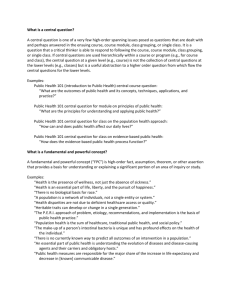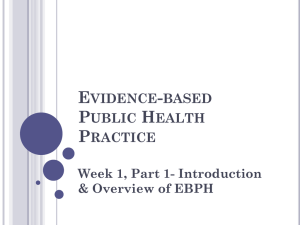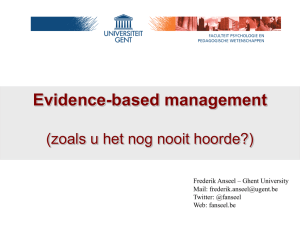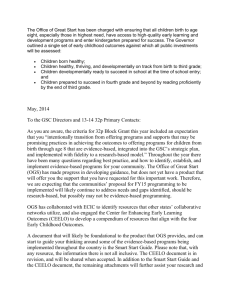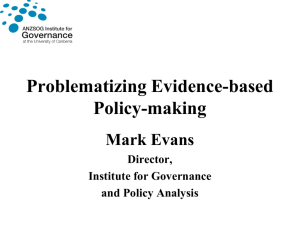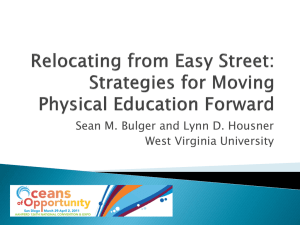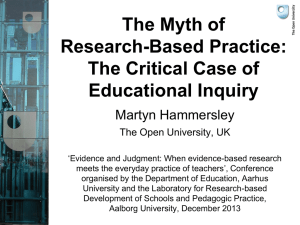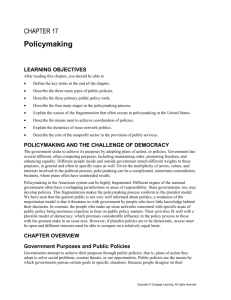OXFORD PAPER HANDOUT
advertisement
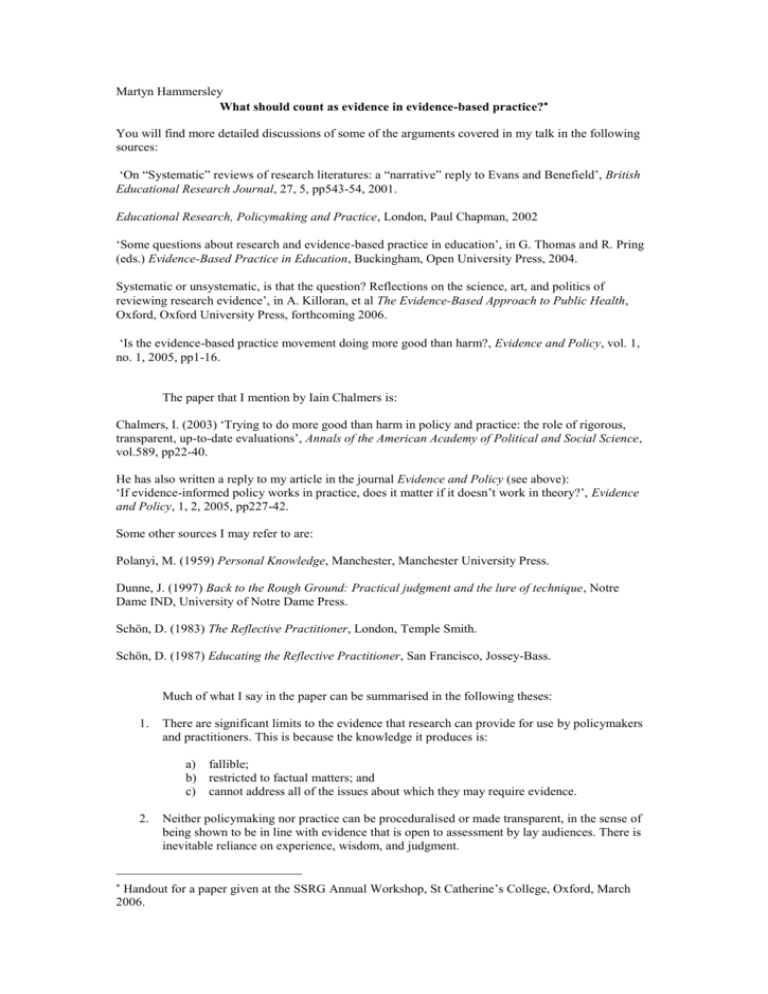
Martyn Hammersley What should count as evidence in evidence-based practice? You will find more detailed discussions of some of the arguments covered in my talk in the following sources: ‘On “Systematic” reviews of research literatures: a “narrative” reply to Evans and Benefield’, British Educational Research Journal, 27, 5, pp543-54, 2001. Educational Research, Policymaking and Practice, London, Paul Chapman, 2002 ‘Some questions about research and evidence-based practice in education’, in G. Thomas and R. Pring (eds.) Evidence-Based Practice in Education, Buckingham, Open University Press, 2004. Systematic or unsystematic, is that the question? Reflections on the science, art, and politics of reviewing research evidence’, in A. Killoran, et al The Evidence-Based Approach to Public Health, Oxford, Oxford University Press, forthcoming 2006. ‘Is the evidence-based practice movement doing more good than harm?, Evidence and Policy, vol. 1, no. 1, 2005, pp1-16. The paper that I mention by Iain Chalmers is: Chalmers, I. (2003) ‘Trying to do more good than harm in policy and practice: the role of rigorous, transparent, up-to-date evaluations’, Annals of the American Academy of Political and Social Science, vol.589, pp22-40. He has also written a reply to my article in the journal Evidence and Policy (see above): ‘If evidence-informed policy works in practice, does it matter if it doesn’t work in theory?’, Evidence and Policy, 1, 2, 2005, pp227-42. Some other sources I may refer to are: Polanyi, M. (1959) Personal Knowledge, Manchester, Manchester University Press. Dunne, J. (1997) Back to the Rough Ground: Practical judgment and the lure of technique, Notre Dame IND, University of Notre Dame Press. Schön, D. (1983) The Reflective Practitioner, London, Temple Smith. Schön, D. (1987) Educating the Reflective Practitioner, San Francisco, Jossey-Bass. Much of what I say in the paper can be summarised in the following theses: 1. There are significant limits to the evidence that research can provide for use by policymakers and practitioners. This is because the knowledge it produces is: a) fallible; b) restricted to factual matters; and c) cannot address all of the issues about which they may require evidence. 2. Neither policymaking nor practice can be proceduralised or made transparent, in the sense of being shown to be in line with evidence that is open to assessment by lay audiences. There is inevitable reliance on experience, wisdom, and judgment. Handout for a paper given at the SSRG Annual Workshop, St Catherine’s College, Oxford, March 2006. 3. Attempts to proceduralise policymaking and practice on the basis of research evidence may well lead to undesirable results: the privileging of formal targets over what is recognised to be of priority in the circumstances, the following of procedures even where these are not adequate to the situation, and so on. 4. The evidence-based practice movement is functioning as part of the ‘new public management’, which is fuelled by an aversion to risk and an aversion to dependence on the expertise of professionals. Yet: a) bad outcomes can never be completely avoided, are not always the product of wrong judgments, and no activity, however ‘evidence-based’, can avoid making mistakes; b) seeking to render practitioners accountable can worsen the quality of the work they do through undermining their confidence in their own expertise or putting constraints on them that require actions that are at odds with what they judge to be best. 5. The evidence-based practice movement often seems to rely on a naïve model of the nature of policymaking, one that overlooks or plays down the role of power, uncertainty, and chance. It seems to be wedded to what has been referred to as the rational model, whereby policy is a matter of deciding what is best for dealing with some problem in technical terms. Much work in political sociology has shown that this rational model does not capture the processes involved, and that it is rarely if ever likely to be appropriate. Decision-making is inevitably a much messier process, in which there is manoeuvring on the part of various parties involved, as well as negotiation and compromise, so that issues beyond ‘technical’ ones about what is the best solution often loom large. Moreover, what is best is rarely a consensual matter, nor can it usually be. 6. In these terms, the evidence-based policymaking and practice movement, like the notion of new public management, must itself be seen as an element in current battles over how public policymaking in contemporary western societies should operate, whose interests should count, what goals are the priority, and so on. The idea that this movement is about advancing effectiveness, efficiency, and democratic accountability, while true in some respects, should not be allowed to blind us to the interests that are actually at work: that this movement is implicated in trends towards commercialisation of the public sector, and (more broadly) its subordination to ‘economic’ interests. In summary, I suspect that increasing the role of research in policymaking and practice will not produce a step-change in overall quality, even though it can make smaller and more specific contributions. Moreover, in some contexts increasing the weight given to research evidence may worsen the quality of the decisions made. And the discourse of evidence-based practice obscures the diverse value considerations involved, and the scope for disagreement, about what is and is not an improvement. Finally, we should recognise the sociological point that our ideas, arguments, preferences, and so on are caught up in societal movements of one sort or another. Just as arguments in favour of professional judgment can be used to protect professional self-interest at the expense of the interests of others, so too those involved in arguing for evidence-based practice are not simply rational actors advocating what is obviously valid. They too are caught up by socio-political forces that are currently in play in society. We can never entirely escape the influence of those forces, but nor is that necessary or even desirable. What is important is to try to monitor their influence on us so that we can attempt to counter any negative effects. It is particularly important to avoid good arguments being pushed through to bad conclusions and damaging consequences. This paper is offered in this spirit.
